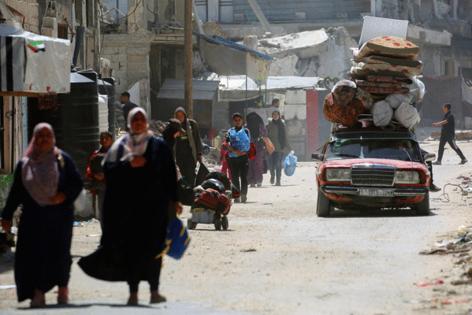Israel 'carving' new corridor in south Gaza, Netanyahu says
Published in News & Features
JERUSALEM — Israel is “carving up” the Gaza Strip in a bid to pressure Hamas into freeing hostages and will establish a new corridor, parallel to the Egyptian border, Prime Minister Benjamin Netanyahu said with the army escalating ground operations in the south.
As mediators try to cobble together another ceasefire and hostage-release deal, Israel has been carrying out airstrikes and incursions with a new threat to seize and annex land. The resumed offensive has spelled fresh, en masse displacements for Palestinian civilians.
In a statement Wednesday, Netanyahu described overnight Israel Defense Forces advances around Rafah, a city on Gaza’s southern border with Egypt, as a “shifting of gears” in the almost 18-month war against the Iranian-backed Palestinian faction.
“We are doing another thing. We are seizing the ‘Morag Corridor.’ This will be the second Philadelphi Corridor — an additional Philadelphi Corridor,” he said.
The Philadelphi Corridor runs along the Gaza-Egypt border and was commandeered by the IDF last year in what Netanyahu called a precaution against arms smuggling to Hamas. “Morag Corridor” appeared to refer to a Jewish settlement that had been located some 5 km (3 miles) from the border and was evacuated during Israel’s 2005 Gaza pullout.
Palestinian residents reported heavy barrages. Israel on Monday had urged civilians there to move to Al Mawasi, an area up the coast that it has designated as safer for them, ahead of what it predicted would be “intense fighting” with Hamas.
“The bombing from the air, sea and land did not stop through the morning,” said Hesham Al-Shaer, who’s in an area northwest of Rafah.
Israel’s military will bring a new army division — which typically consists of 10,000 troops or more — to Gaza, the country’s Kan radio said. The IDF did not comment on that.
A six-week truce that saw dozens of hostages traded for hundreds of Palestinians jailed by Israel expired last month. Israeli officials have said their attacks — and a halt to aid imports to Gaza — won’t stop until Hamas releases all remaining 59 hostages and relinquishes its power and arsenal. Hundreds of Palestinians have been killed, according to the Hamas-run health ministry in Gaza, bringing the total death toll since the war started in October 2023 to more than 50,000.
The IDF said it had encircled the Tel al-Sultan district of Rafah, killing dozens of Palestinian gunmen and dismantling weaponry that included two rockets and a launcher aimed at Israel.
Netanyahu has said he will use both diplomacy and force to recover the hostages — between 21 and 24 of whom are thought to be alive. He says Israel’s operations are causing Hamas, designated a terrorist organization by the U.S. and many other countries, to ease its negotiating demands.
“We are now carving up the Strip and are increasing the pressure, step by step, so that they will hand over the hostages,” Netanyahu said.
The main Israeli group for families of hostages held in Gaza said it was “horrified” to learn of the Rafah operation, arguing that it would put the lives of captives at risk and that the government must reach a deal with Hamas immediately to get them out.
Talks are underway via mediators Qatar, Egypt and the U.S. for a new ceasefire, with Hamas offering to free five surviving hostages for a 50-day truce. Israel submitted a counter-offer that includes a demand for the release of 11 hostages on the first day of a 40-day ceasefire, Ynet reported.
Hamas killed 1,200 people and took 250 hostages when it attacked Israel from Gaza on Oct. 7, 2023, triggering the war. Many of the captives were released during a ceasefire in late 2023 and the more recent truce. Israel has lost hundreds of soldiers in the war.
Israel’s multi-front conflict with Iranian proxy militias is escalating after a period of calm earlier in the year. As well as the truce in Gaza breaking down, a ceasefire with Hezbollah is under strain, with Israeli forces striking Lebanon’s capital of Beirut twice in the past week. The Houthis, based in Yemen, have also resumed missile assaults on Israel, despite daily U.S. attacks against their positions since mid-March.
Israeli financial assets have been hit by a combination of the worsening conflict and rising tensions within the country — characterized by large protests — over the government’s attempt to fire officials such as the attorney-general and the head of Shin Bet, the domestic-intelligence service.
The shekel is down 2.4% against the dollar in the last month, one of the world’s worst performances.
_____
(With assistance from Jason Kao.)
_____
©2025 Bloomberg L.P. Visit bloomberg.com. Distributed by Tribune Content Agency, LLC.







Comments